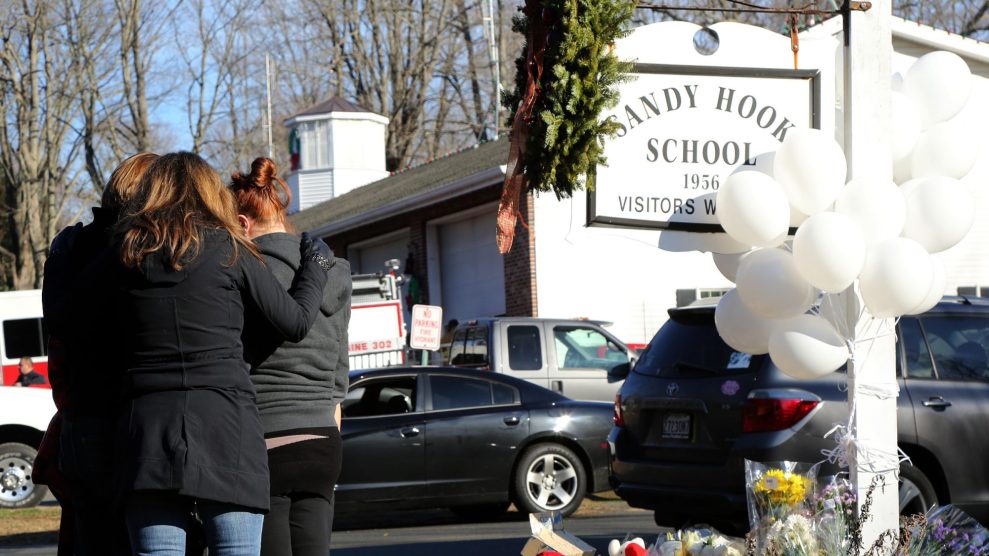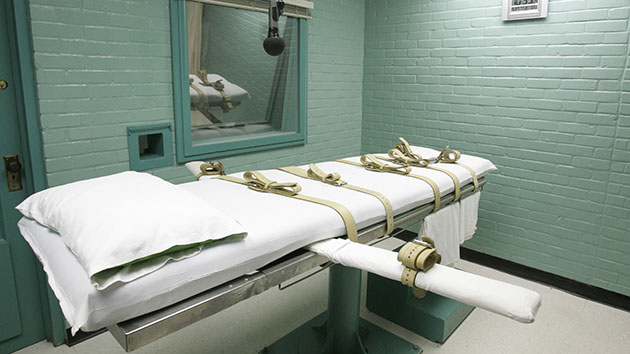
Some of the victims of the 2012 mass shooting at Sandy Hook Elementary School will graduate high school on Wednesday night. Phillip Vaughan/Ace Pictures/Zuma
When the seniors at Newtown High School in Connecticut graduate on Wednesday, 20 peers will be missing: the kids who were brutally murdered in the 2012 mass shooting at Sandy Hook Elementary School.
The massacre, one of the country’s worst school shootings in history, immediately drew national attention as well as demands to prevent such tragedies with more robust gun control legislation.
“As a country, we have been through this too many times,” then-President Barack Obama said when he tearfully addressed the nation on Dec. 14, 2012, the day of the shooting. “We’re going to have to come together and take meaningful action to prevent more tragedies like this irregardless of the politics,” Obama continued.
A month later, the president announced nearly two dozen executive actions aimed at reducing gun violence. The GOP and the gun lobby ultimately tanked other efforts proposed in Congress, blocking legislation that included an assault weapons ban and a bipartisan proposal that would have expanded background checks.
Since then, mass shootings have seemingly continued unabated—at an outdoor music festival in Las Vegas, where a gunman killed 58 people and left more than 800 injured in 2017; at Marjory Stoneman Douglas High School in Parkland, Florida, where a gunman killed 17 people and left another 17 injured in 2018; and at an elementary school in Uvalde, Texas, where a gunman killed 21 people and injured 17 in 2022. And the pace of these shootings only appears to have escalated: Since 2000, 6 of the ten deadliest mass shootings in the US post-Columbine occurred after Sandy Hook, according to Giffords. (The exact number of mass shootings that have occurred at schools, specifically, since Sandy Hook is difficult to pin down because of how data is collected.)
Each of these tragedies renewed calls for gun control—and Republicans have consistently responded by blocking legislative efforts to create change and offering “thoughts and prayers” instead. They also regularly deflected to talking points about the need to bolster mental health care and improve other school safety measures that did not include restricting guns.
“I really thought Sandy Hook would, you know, shock people and wake everybody up, but it just keeps happening over and over and over again,” Sandy Hook survivor, senior Henry Terifay, told Good Morning America this week ahead of Wednesday’s graduation.
“I just think people in power or people that have the power to make change should do it instead of the 17, 18-year-olds trying to do their work for them,” added another senior, Emma Ehrens.
As survivors of the 2012 Sandy Hook massacre prepare to graduate from high school today, some of the students sat down with ABC News' Chief Anchor @gstephanopoulos to speak about the future. https://t.co/xtpMmMj6Il pic.twitter.com/lyFRy9EJTm
— ABC News (@ABC) June 12, 2024
The number one gun control measure Sandy Hook survivor Ella Seaver said she would like to see enacted is “regulation on AR-style assault weapons,” frequently used in mass shootings, including at Sandy Hook. But there is still no such federal legislation in place; these weapons remain broadly available in all but 10 states, plus D.C., which have passed state-level bans, according to the gun control research and advocacy organization Giffords. And according to the gun control research and advocacy organization Everytown, federal law does not require universal background checks for private gun sales, which make up most gun sales nationwide and include those that take place between friends or family or at gun shows, for example.
The majority of states also still lack so-called “red flag” laws, which allow a judge to restrict gun access while someone is in crisis, and loopholes remain in enforcing such interventions at the federal level, according to Everytown; research has shown these laws can be effective in helping to prevent gun violence.
There are some developments to feel hopeful about, though: As my colleague Mark Follman has reported in his epic recent investigation, “Lessons from a Mass Shooter’s Mother,” the growing field of behavioral threat assessment is helping to stop potential mass shootings before they occur in more than a dozen states that require this response after someone close to a person in crisis reaches out to authorities. As Mark writes:
Made up of psychologists, administrators, law enforcement, and other trained practitioners who meet regularly to handle cases, the team conducts interviews and gathers information to gauge the danger. Then, over weeks or months, they use constructive tools like counseling, social services, and education support to guide the troubled person away from what the field calls “the pathway to violence.”
This underscores a bigger point Mark has made that is worth keeping in mind: mass shootings can be prevented. They are not inevitable. And part of what helps threat assessment professionals prevent them is the growing body of research experts have amassed identifying warning signs of potential shooters, as well as gun control laws that have passed at the state level.
Still, even against that hope, what hasn’t changed since 2012 is a sobering reminder of the devastating toll gun violence continues to take on American lives, and the political inertia that continues to prevent meaningful change. One of the Sandy Hook survivors, Lilly Wasilnak, now 17, may have summed it up best in her recent interview on Good Morning America: “As unfortunate as it is, it’s going to happen to someone else, and it’s going to keep happening to someone else until people like us have to make the change.”
















